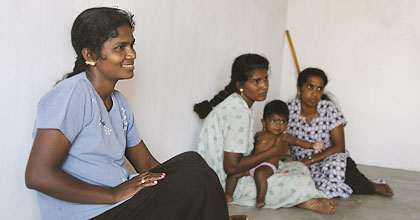BANKING ON RURAL MICROFINANCE

Sasikala Thangamani (left), the local treasurer of an informal women's
union which distributes micro-credit loans, seen here with some of
her members.-Keith Lin
These schemes have also found a supporter in former US president Bill Clinton, the United Nations' special envoy for tsunami relief, who stresses their importance in restoring survivors' livelihoods after visiting the nation earlier this year.
"To diversify the affected economies, we need to make small loans - micro-credit - available for new ventures or for the expansion of existing ones," he writes in a New York Times column in June.
It is by no coincidence that women are at the forefront of this initiative. Microfinance institutions and cooperative unions say women in rural communities have proven to be better at holding the pursestrings in times of disaster.
"Many women face serious financial difficulty after losing husbands or bread-winning elder children during the tsunami," says Nandasiri Gamage, manager of the Colombo-based women's union that Devagi belongs to.
Flush with funds solicited from foreign donors, Gamage and his team of eight women regularly travel to communities decimated by the temblor. They distribute loans ranging from 20,000 to 80,000 rupees each after considering the villagers' specific needs.
"We want to help the women as much as possible because many of the men have turned to drinking (after the tsunami)," says Gamage, adding that "they know they have no other choice but to guard the money carefully."
Dirk Steinwand, a microfinance advisor to a foreign aid agency operating here, says the country's high female literacy rates appealed to overseas donors.
"The women here are generally well educated, making micro-credit loans that cater to them a very effective tool to create employment," adds Steinwand, who has been living in Sri Lanka for the past decade.
Still, critics say such schemes, which according to monetary authorities could now number "in the thousands", are no panacea, questioning the financial credibility and primitive accounting practices of those who oversee them.
As union manager Gamage admits, "we didn't send (our sponsors) sophisticated proposals, only small details. We've known them for a long time, (so) they trust us."
Monitoring the seethus' archaic activities is also a perennial headache for Kalmunai's assistant divisional secretary Vanniyasingam Vasuthevan, who estimates that the villagers in his ward have squandered up to a quarter of the loans made available to them.
« prev | next »